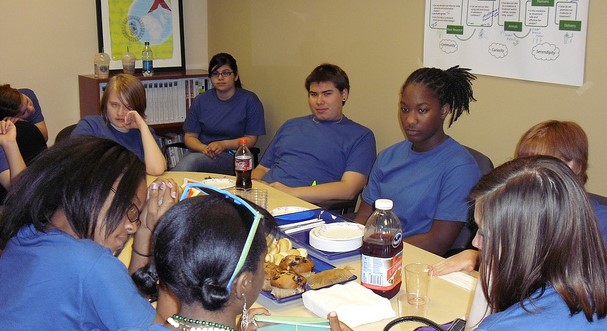K-12 Spotlight: What One Family Foundation is Doing for Oakland Public Schools
/
We write often about the big K-12 funders like Walton and Gates, and their grand national plans for improving education. But the only way to fully understand K-12 philanthropy is to get down in the weeds of grantmaking by local funders intent on improving local schools. Which is why we regularly cover the strategies of other foundations in different cities.
A great example of a hard-driving local ed funder is the Rogers Family Foundation (RFF), which is laser-focused on K-12 education in Oakland. It's a great foundation for education groups in the Bay Area to know; it's also interesting for outside groups, especially if you want to know how the personalized learning trend is playing out in different places, since this is a big interest at RFF.
The foundation has grown in power and prominence since 2003, yet has remained committed to high quality public schools in Oakland. Recently, it made $2.1 million in grants to the Oakland Unified School District to solidify its local K-12 education support. The main focus with these grants is personalized learning, and the grants are going to six schools in the district.
A handful of schools that received planning grants from the foundation in 2015 received $350,000 over two years to launch personalized learning programs this fall. Twelve schools applied, but the six that stood out were ASCEND K-8, Lodestar, Redwood Heights Elementary, Roosevelt Middle School, Urban Montessori, and Urban Promise Academy.
Not only are these schools receiving grants from the Rogers Family Foundation, but they’re also getting guidance and support from a national nonprofit known as the Mastery Design Collaborative. When it’s all said and done, over 3,000 students will be served by these programs, a majority of which come from low-income households.
There’s a huge push right now across the country to design personalized learning experiences for today’s K-12 students. A growing number of funders are involved in this push. Basically, the concept involves offering curriculum and learning environments that meet students' diverse and individual needs, which is always a challenge in districts that are strapped for cash. There are a lot of questions about the effectiveness of personalized learning, which is still evolving, but strong interest from a wide spectrum of educators who agree that yesterday’s education models aren’t getting students where they need to be in terms of career and college prep. Many also see this area as a good place for philanthropy to play a role that's not as divisive as other strategies that private funders have often pushed. As we've reported, the Gates Foundation—which appears to be tacking in a less polarizing direction with its K-12—is moving deep into personalized learning.
Related:
- PersonalizedLearning Is a Big, Exciting Idea. But Can Funders Like Gates Get It Right?
- A Funder's Big Bet That PersonalizedLearning Tools Can Improve Chicago Public Schools
- A Tech Billionaire's Wife Leads a Push to Reinvent K-12 With PersonalizedLearning
“For all of our students to be college, career, and community ready, more schools will need this type of philanthropic support to redesign programs and personalize their learning," OUSD superintendent Antwan Wilson, said in a press release.
The Next Generation Learning Challenge Grant (NGLC) named Oakland as one of seven places in the U.S. where education innovation is most needed, and the Rogers Family Foundation has been chosen to lead the initiative’s design and launch it at the local level. RFF has also indicated that it will invest in additional schools in the future so that they can create and/or redesign personalized student-centered schools as well.
Blended personalized learning is just one of three of RFF’s education strategies. The other two are quality schools (creating new and redesigned high-quality schools with the collective capacity to serve 10,000 students) and Early Literacy (improving the literacy of a minimum of 2,500 K-3 public school students through collaboration, evidenced-based interventions, and a system of community supports). All three of these issues are foundation goals by the year 2020.
The Rogers Family Foundation is accessible and transparent. After determining your organization’s eligibility, the next step in pursuing a RFF grant is contacting the staff and discussing your idea. With this funder, it’s all about having an initial conversation, not preparing a bunch of paperwork that will be quickly rejected because you’re not on the same page. (To reach out, complete the foundation’s online contact form.)
While much of the Rogers Family Foundation’s focus is on its Oakland education strategy, the foundation also selectively supports a limited number of local capital projects as well as a variety of other interests, most notably those associated with University of California – Berkeley, the University of California – San Francisco, and a limited number of Oakland community institutions.








